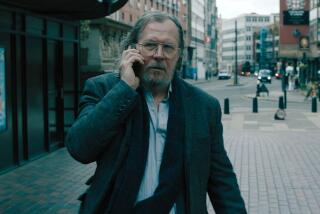Movie Reviews : ‘Slow Moving Train’ Chugs on the Right Track
- Share via
People probably use “Pinteresque” too much to describe a certain kind of stage or film dialogue. But the term fits the cryptic Australian thriller, “Warm Nights on a Slow Moving Train” (Beverly Center Cineplex). Most of the talk is spare, allusive; everyday chatter sliced into stylized chunks, deceptively casual but pointed badinage that seems to conceal sinister portents, inner madness.
The movie suggests what might have happened if Pinter, Ionesco and Albee had tried a joint invasion of “The Lady Vanishes.” In “Warm Nights,” every conversation is, to some extent, a combat, a game or a riddle. The characters are abstract, defined by their roles. Only one of them, a professional politician, even has a name.
The central figure, the Girl (Wendy Hughes), is a chameleon-like hooker who seduces men on a weekend night train, changing her personality to suit every fresh conquest. At first, the film seems to be getting its mileage out of a sly sexual reversal. The Girl treats men the way obsessive Don Juans often treat female conquests: kicking them all out on the dot of 3 a.m., ignoring them afterward. The train, hurtling through its endless night, with the same lounge car piano revelry, the same metronomic clack-clack pace, is the site of continuous erotic variations always building to the climactic zinger, “Of course, you’ll have to pay.”
But gradually, the story becomes a fable about good, evil, the puzzles of identity, the dangers of compartmentalizing love. The Girl has a “moral” motive. And she meets a Man (Colin Friels) who seems to offer escape, love or a darker, more dangerous temptation.
It would be wrong to synopsize more. “Warm Nights on a Slow Moving Train” gets its effects almost entirely from the felicities of its acting and the continuous twists and turns of the plot. It’s best to go into it as cold as possible.
Director-co-writer Bob Ellis was the scenarist for several of Paul Cox’s films, including “Man of Flowers,” “Cactus” and “My First Wife.” He has a gift for the macabre humors of alienation and the pith of solitary pain. He knows how to startle us with a quick twist of phrase, a sudden move in an unexpected direction. It’s a clever if abstract show in a dry, cold “House of Games” mood.
But, as a director, Ellis has almost no visual style. “Warm Nights” looks flat and empty, and though this stylelessness has the merit of fixing attention on the dialogues, it becomes monotonous, like the clack of the rails. There’s also something over the top and hasty about Ellis’ last act. It comes too suddenly, it’s too drastic--and it seems more metaphoric than dramatic.
It’s the actors who make this train run on time, especially Friels as the rough lover, Norman Kaye as a born-again widower, Peter Whitford as a gay steward and Steve J. Spears as a funky singer. And, most of all, Hughes as the many-masked prostitute.
Hughes has a thin face and pale, yearning eyes that make her great for obsessive roles. Along with Kaye, she once beautifully limned the agonies of sexual repression in Cox’s “Lonelyhearts,” and it’s fun to see them eyeing each other lecherously here, playing seduction games, nailing down together the harsher solitude of joyless hedonism.
But there’s no fun at the core. Hughes has the delicately balanced, distant look of someone you’ll never reach. She suggests both cold, calculated sensuality on top and bitter resignation below; her face, in her near-anonymous grapplings, takes on the ashen pallor of someone caught in a mechanical embrace. For this woman, flesh is never warm, sweat is never wet, joy lies bleeding and sex is always over, on the dot, at 3 a.m.
More to Read
Only good movies
Get the Indie Focus newsletter, Mark Olsen's weekly guide to the world of cinema.
You may occasionally receive promotional content from the Los Angeles Times.










